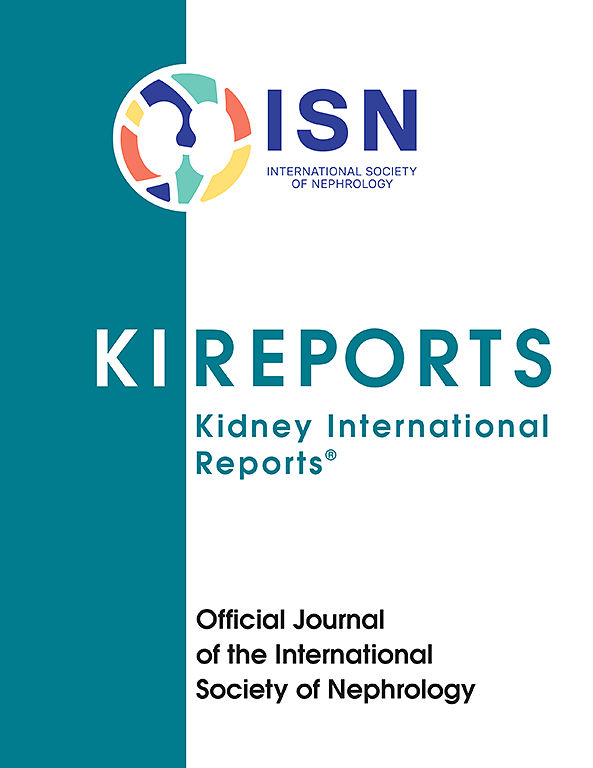睡眠特征对肾功能正常成人GFR快速下降的影响
IF 5.7
2区 医学
Q1 UROLOGY & NEPHROLOGY
引用次数: 0
摘要
本研究旨在评估初期肾功能正常的成人自我报告的睡眠特征与估计肾小球滤过率(eGFR)快速下降之间的关系。方法对Fasa成人队列研究(FACS)再评估阶段参与者的数据进行分析。eGFR快速下降被定义为每年下降>;3 ml/min / 1.73 m2, eGFR百分比快速下降定义为年下降>;研究样本的第10个百分位数。每日睡眠时间、日间午睡、睡眠发作潜伏期(SOL)、安眠药使用情况和日间嗜睡情况由训练有素的护士进行访谈,作为基线进行评估。应用泊松回归模型评估不同睡眠特征的结果风险。结果共纳入2810例受试者,其中女性53.7%,平均年龄49.8(±8.3)岁,基线eGFR为88.5(±10.6)。在老年人中,有规律的白天小睡与eGFR快速下降的风险降低有关。50年(校正相对危险度[RR]: 0.64, 95%可信区间[CI]: 0.48 ~ 0.86)。具体来说,与不午睡的人相比,每天午睡超过90分钟的风险降低了49%(调整后的RR: 0.51, 95% CI: 0.33-0.81)。年龄<;50年,睡眠<;7 h/d与eGFR快速下降的可能性更高(调整后的RR:1.78, 95% CI: 1.12-2.82)。结论有规律的白天午睡,尤其是老年人,可能对肾功能下降有保护作用,而短时间睡眠可能会加速年轻人eGFR下降。解决睡眠习惯可能有助于预防慢性肾脏疾病(CKD)。本文章由计算机程序翻译,如有差异,请以英文原文为准。
Effect of Sleep Characteristics on Rapid Estimated GFR Decline in Adults with Normal Kidney Function
Introduction
This study was conducted to evaluate the association between self-reported sleep characteristics and rapid decline of estimated glomerular filtration rate (eGFR) in adults with initially normal kidney function.
Methods
Data from participants in the reevaluation phase of the Fasa Adult Cohort Study (FACS) were analyzed. Rapid eGFR decline was defined as an annual decrease > 3 ml/min per 1.73 m2 and rapid eGFR percent decline was defined as an annual decrease > 10th percentile of study sample. Daily sleep duration, daytime napping, sleep onset latency (SOL), the use of sleeping pills and daytime sleepiness were assessed at baseline through interviews conducted by trained nurses. Poisson regression models were applied to evaluate the risk of outcomes across sleep characteristics.
Results
A total of 2810 participants, of whom 53.7% were female, with a mean age of 49.8 (± 8.3) yrs and a baseline eGFR of 88.5 (± 10.6) were studied. Regular daytime napping was associated with a reduced risk of rapid eGFR decline in individuals aged > 50 yrs (adjusted relative risk [RR]: 0.64, 95% confidence interval [CI]: 0.48–0.86). Specifically, naps exceeding 90 minutes daily were associated with a 49% reduced risk compared with nonnappers (adjusted RR: 0.51, 95% CI: 0.33–0.81). Among participants aged < 50 yrs, sleeping < 7 h/d was linked to a higher likelihood of rapid eGFR percent decline (adjusted RR:1.78, 95% CI: 1.12–2.82).
Conclusion
Regular daytime napping, especially in older adults, may be protective against kidney function decline, whereas short sleep duration may accelerate eGFR decline in younger adults. Addressing sleep habits may aid in preventing chronic kidney disease (CKD).
求助全文
通过发布文献求助,成功后即可免费获取论文全文。
去求助
来源期刊

Kidney International Reports
Medicine-Nephrology
CiteScore
7.70
自引率
3.30%
发文量
1578
审稿时长
8 weeks
期刊介绍:
Kidney International Reports, an official journal of the International Society of Nephrology, is a peer-reviewed, open access journal devoted to the publication of leading research and developments related to kidney disease. With the primary aim of contributing to improved care of patients with kidney disease, the journal will publish original clinical and select translational articles and educational content related to the pathogenesis, evaluation and management of acute and chronic kidney disease, end stage renal disease (including transplantation), acid-base, fluid and electrolyte disturbances and hypertension. Of particular interest are submissions related to clinical trials, epidemiology, systematic reviews (including meta-analyses) and outcomes research. The journal will also provide a platform for wider dissemination of national and regional guidelines as well as consensus meeting reports.
 求助内容:
求助内容: 应助结果提醒方式:
应助结果提醒方式:


